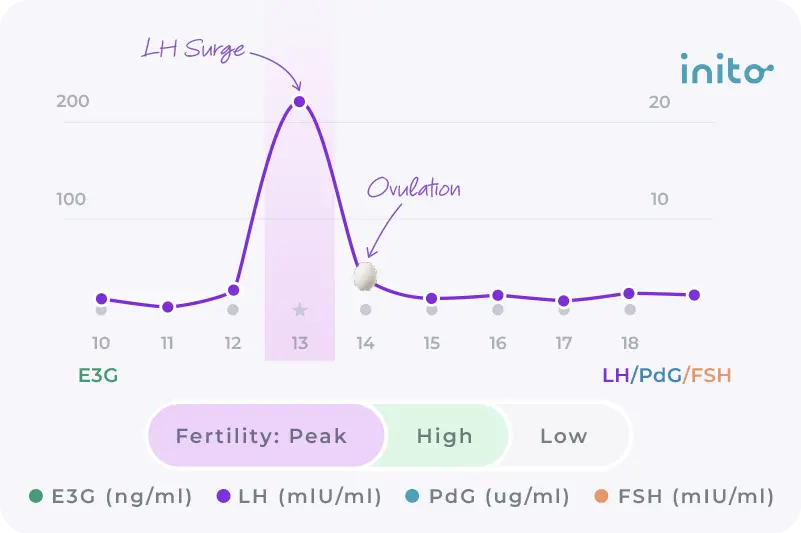Content table
Depending on the stage of pregnancy, a brown discharge could mean multiple things. It could be a normal sign in early pregnancy, mostly referred to as spotting.
Now, don’t get too comfortable.
If the brown discharge comes with other not-so-friendly symptoms, it could signal an underlying health condition. Read on as we talk about brown discharges during pregnancy and what to be wary of.
Key takeaways
- Although some causes of brown discharge are usual, we must keep an eye on other symptoms.
- If you feel uncomfortable or notice strange signs like abdominal pain, fever, or dark discharge, you should visit your doctor.
- Brown discharge during pregnancy may indicate that you are pregnant. However, it is best to use a pregnancy test for confirmation.
- Brown discharge also helps to ensure your and your baby’s health.
What is brown discharge?
When oxidized blood mixes with your vaginal discharge, it appears as brown discharge.
Blood is typically red in color. But when it comes in contact with oxygen (aka oxidation), it turns into shades of brown.
But one thing that doesn’t seem to add up is how the blood comes out brown if it hasn’t been exposed to oxygen.
Well, since the bleeding is very little, the flow speed is also quite less, meaning that it will take time for the blood to flow from your cervix to your vagina and then out. This gives it time to react with little oxygen in its surroundings, leading to the brown color you see on your underwear.
Causes of brown discharge during pregnancy
In most cases, brown discharge isn’t worrisome. However, if it’s accompanied by other symptoms, like vaginal itching, pain, unpleasant smell, or irregular menstrual cycle, it can signify an underlying health condition.
Let’s take a quick dive into some of the common causes of brown discharge at different stages of pregnancy:
Early pregnancy
If you just got pregnant and are in your early stages, you may experience light bleeding or brown discharge.
According to data, 20% to 40% of pregnant women have light brown spotting during their first trimester. This is no cause for concern, but you can cross-check with your doctor to make ensure everything is fine.
Other reasons that can cause brown discharge during the first trimester include:
Implantation bleeding
Vaginal discharge may happen in your the early stages of pregnancy because of implantation bleeding. It can lead to a faint brown discharge as your body sheds off the blood that oozed out due to implantation.
Hormonal changes
During your pregnancy, your body goes through rapid hormonal changes. This causes an increase in the blood flow to your cervix. Now, if you have a sensitive cervix, even a minor irritation can cause bleeding. When this mixes with vaginal secretions, it can appear as a brown discharge.
Ectopic pregnancy
Ectopic pregnancy is a rare yet major cause of brown discharge that can lead to pregnancy loss. It occurs when a fertilized egg grows outside the uterus, for instance, in the fallopian tube and cannot survive outside the womb.
In this case, brown discharge is often accompanied by vaginal bleeding and extreme pain. Some people may even notice pain in a part of their abdomen or difficulty using the toilet.
If you experience similar symptoms, get immediate treatment to avoid serious complications.
During pregnancy
Sometimes, a brown discharge can happen in the first, second, or third trimester due to the following causes:
Cervical polyps
Cervical polyps are growths that are found around the cervix. They are finger-like projections originating from the mucosal layer of the cervix. Depending on how sensitive your cervix is, irritation can cause these polyps to bleed.
Doctors don’t advise that you remove these growths while pregnant unless necessary. In fact, a particular study notes that removing polyps during pregnancy can increase your risk of miscarriage or preterm delivery.
Miscarriage
A brown discharge may tell you if you have lost the baby or not. However, this is not the overruling symptom of pregnancy loss.
Other symptoms include:
- Uterine contractions
- Abdominal pain
- Tenderness in the abdomen
- Weight loss
- Passing thick clots of blood
Contact your doctor as soon as you notice any of these symptoms.
Read More: Implantation Bleeding vs. Miscarriage
Late pregnancy
As you approach the end of your pregnancy, that is the third trimester, brown discharge can show that you’re about to deliver, or there are certain underlying complications.
Bloody show:
This is the release of blood and mucus from your vagina towards the end of your pregnancy. It shows that labor is about to begin.
Preterm labor
Preterm labor usually comes with discharge that happens towards the end of your pregnancy. Besides bleeding, other indications of preterm labor include:
- Backache
- Abdominal cramps
- Regular contractions
- Pelvic pressure
- Water break
If you notice any of these symptoms, consult your doctor as soon as possible.
Placenta previa
Placenta previa is a condition where the placenta attaches low in the uterus, covering the cervix either partly or fully. As the placenta lies near the cervix, some women may experience spotting or bleeding.
When to see a doctor?
If your brown discharge lasts for weeks, has a strong odor, or even happens after sex, then seek immediate medical help.
Additionally, visit your doctor if you notice symptoms like:
- Pelvic pain
- Vaginal itching
- Pain while urinating
Should I be worried?
Around implantation, you may see pink or brown blood from implantation bleeding, which is entirely normal.
If you and your partner had unprotected sex and see a brown discharge instead of a period, it would be wise to go for a pregnancy test as well.
Managing a brown discharge during pregnancy
The treatment you’ll get will not always be the same because the cause of your discharge may vary. For instance, if you live with a vaginal infection, your doctor may give you antifungal or antibiotic medications depending on the type of infection.
To avoid the discomfort that comes with abnormal discharge, vaginal hygiene is the number #1 rule:
- Don’t douche: Your vagina is much cleaner than you think and automatically cleans itself through these discharges! You can wash it with water, but putting soap inside can cause irritation and disruption in the normal flora leading to bacterial vaginosis (BV).
- Avoid using perfume: Keep these away from your vagina, from scented soaps to wipes. It will not only irritate you but lead to yeast infections.
- Wear breathable panties: Yes, you heard that right! The best types is cotton underwear. Also, change them daily to avoid infections.
- Change your clothes frequently: This is important, especially if you sweat a lot. Dampness is the perfect breeding ground for harmful bacteria.

FAQs
It’s nothing to worry about but ask your doctor just to be on the safe side. Sometimes, dark brown discharge while pregnant could be a sign of miscarriage.
Other signs of miscarriage are cramps, so if you have a mixture of cramps and abnormal discharge, then call your doctor.
Was this article helpful?
- Vaginal Bleeding In Early Pregnancy. Human Reproduction
- Jennings LK, Krywko DM. Pelvic inflammatory disease. In: StatPearls. StatPearls Publishing; 2021.
- Spence D, Melville C. Vaginal discharge. BMJ. 2007;335(7630):1147-1151.
- Hasan R, Baird DD, Herring AH, Olshan AF, Jonsson Funk ML, Hartmann KE. Patterns and predictors of vaginal bleeding in the first trimester of pregnancy. Ann Epidemiol. 2010;20(7):524-531.
- Practitioners TRAC of general. Early pregnancy bleeding. Australian Family Physician.












